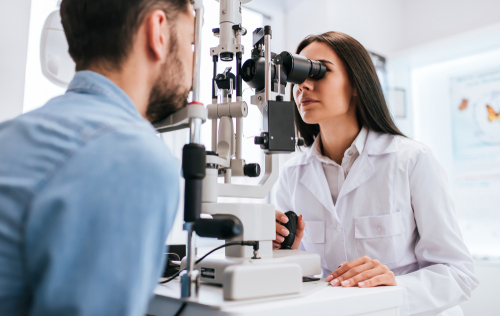
Staying healthy is important no matter what age you are. But it’s easy to let your eyes get forgotten when there are other things to worry about.
Sight is a big part of the human experience, and it needs to be taken care of just as well as the rest of our bodies. As with most other aspects of our health, diet and exercise play a role in our eye health.
It is also important to see an eye professional frequently. Many vision problems can be stopped or avoided with early intervention.
To do this before any damage occurs, you need to detect the problem. As with any health issue, self-diagnosing is a dangerous road.
Instead, you should schedule an appointment at Vision Care of Maine regularly! Keep reading to learn why you should have regular appointments with your ophthalmologist!
A comprehensive eye exam is the best way to get a detailed look at the state of your vision. It is a series of tests that examine many things.
This includes your general ability to see to specific functions like detecting color or depth perception. How many tests and which ones are performed will depend on factors such as your age, family history, and disease risk. Here are some examples.
A visual acuity test gives your eye doctor a quick glimpse at how well you can see. This is one of the most recognizable tests and it’s performed by having you look at and read off a chart with rows of letters sitting 20 feet away from you.
As you move down the page, each row gets smaller and smaller. If you manage to reach the line with a font size of 20, you will have “20/20 vision”.
Eye doctors will often want to get a physical and detailed look at the inner workings of your eyes. To do this, they will use a special device called a slit lamp.
You will use a special headrest to keep your head as still as possible while the doctor uses this device to shine a bright light into your eye. The device will also magnify with a built-in microscope.
This allows them to detect possible problems like cataracts, conjunctivitis, or signs of macular degeneration.
One of the most important vision problems to test for is glaucoma. This condition is impossible to detect on your own.
Early intervention is the only way to prevent permanent damage. To test for glaucoma, your ophthalmologist will need a measurement of your eye pressure.
They will use an apparatus that blows a brief, but strong puff of air into your eyes. The machine is capable of measuring resistance given by the eye, and calculating the internal pressure based on the reading. High internal eye pressure is a common sign of glaucoma.
There are many other tests involved in a comprehensive eye exam, which is why they often take about 2 hours to complete.
Concerned about the state of your eyes? Schedule an appointment at Vision Care of Maine in Bangor, ME to keep them healthy for years to come!

Almost everyone has allergies to something. Even allergies that are specific to the eye are more common than you would think!
They occur when your eyes react negatively to some form of allergen. When your eyes react, it causes them to release histamines.
Histamines are produced to fight off invaders, but with allergens, your body is usually overreacting. Histamines in the eye can cause swelling, burning, itching, watering, and other symptoms.
Most eye allergies are annoying but harmless, and only need mild treatment to remedy. But some people may suffer from extreme allergic conjunctivitis.
This can lead to serious damage if left untreated. Keep reading to find out if eye allergies can cause other eye conditions!
A severe allergic reaction in your eyes will include many typical allergy symptoms but they are more intense. They include:
If you experience any of these symptoms, seek medical attention as soon as possible.
Severe allergic conjunctivitis is most common for those that already suffer from or have a history of allergies. These include conditions such as eczema, hay fever, and asthma.
If you are experiencing symptoms that are not severe but persistent, you should still see a doctor. When it comes to an allergic reaction, you should never assume that it’s not serious.
The best way to deal with allergies is to reduce your contact with the allergens. Depending on what you are reacting to, this could mean:
If you are still experiencing symptoms you should use eye drops and cold compresses. Stop using makeup or contacts until the issue is resolved.
Above all, do not rub your eyes. This will only make your eyes more irritated in the long run, and could potentially cause damage.
Rubbing your eyes is never a good idea even if they are itchy. If you find that your eyes are itchy, use eye drops or artificial tears instead. This can help flush out any allergens that may be irritating your eyes.
To learn more about eyes, how they work, and how you can take care of them, schedule an appointment at Vision Care of Maine in Bangor today! There’s never a bad time to make your vision a priority!